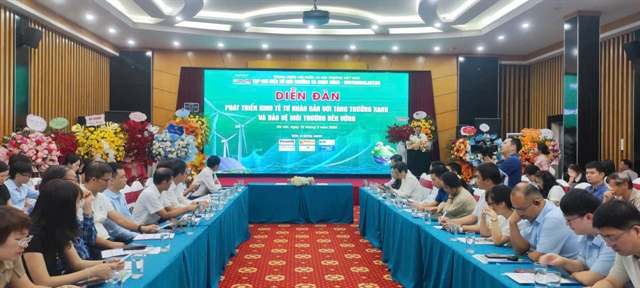 Economy
Economy


|
| A forum on private economic development and green growth was held in Hà Nội on August 15. Photo courtesy of moitruong.net.vn |
HÀ NỘI — For the private sector, already a key pillar of Việt Nam's economy, green growth represents a new and powerful engine for innovation, competitiveness and long-term sustainability.
Editor-in-Chief of Environment and Life Magazine Nguyễn Văn Toàn emphasised these issues at a forum on private economic development and green growth held in Hà Nội on August 15.
The private economy plays a vital role in Việt Nam’s development trajectory. This has been clearly articulated in key political documents, including Resolution 10-NQ/TW (2017) and, more recently, Resolution 68-NQ/TW (2025).
In addition, Việt Nam has adopted the National Strategy on Green Growth for the 2021-2030 period. This strategy aims to restructure the economy in a sustainable direction, reduce greenhouse gas emissions and foster green production and consumption.
“The harmonious combination of private economic growth and environmental protection is not only a pressing requirement, but also a significant opportunity,” Toan noted.
“Green business models, the circular economy and clean energy initiatives are paving the way for economic returns, as well as greater social responsibility and a more sustainable future.”
Also at the forum, Associate Professor Dr Bùi Thị An, a member of the 13th National Assembly and Director of the Institute of Natural Resources, Environment and Community Development, said the private sector contributes around 50 per cent of the country’s GDP and accounts for the largest share of employment at present.
An added that the private sector is expected to increase its share to 55–58 per cent of GDP by 2030, growing at an average rate of 10–12 per cent annually.
She highlighted that private enterprises are at the forefront of Việt Nam’s green transformation, from renewable energy to organic agriculture and environmental services.
In just a few years, Việt Nam has become a leader in Southeast Asia in solar and wind energy. According to REN21 and other independent reports, Việt Nam’s solar capacity reached approximately 18.6GW by 2023, with total wind and solar energy exceeding 21GW. These achievements have largely been driven by private investment, construction and operation.
Private enterprises demonstrate adaptability, innovation and a readiness to lead in Việt Nam’s transition toward a low-carbon economy.
As Việt Nam works toward its commitment to reach net zero emissions by 2050, positioning the private sector at the heart of the green transition is both strategic and necessary.
The sector’s agility, innovation capacity and ability to mobilise capital make it a prime candidate for spearheading this transformation.
According to An, realising this potential requires addressing three key resource challenges: capital access, market development and technology and innovation.
In terms of capital resources, beyond domestic budgets and credit, enterprises need access to international green finance, including climate funds, green credit lines and sustainable bonds.
Việt Nam must also cultivate a domestic green market while leveraging export opportunities under free trade agreements like the EVFTA and CPTPP, which emphasise sustainability standards.
Meanwhile, private firms must be supported in adopting and mastering green technologies, from renewable energy and hydrogen production to circular economy solutions and digital platforms for carbon tracking.
According to experts at the forum, one of the most pressing needs is the development of a stable, transparent and predictable legal framework for green growth. A supportive policy environment will allow businesses to invest with confidence and take a long-term approach to sustainability.
An underscored the importance of incentive mechanisms that exceed basic compliance. These should reward enterprises that pioneer clean technologies and meet international environmental and social standards.
Public-private partnerships should also be promoted, especially in developing large-scale green infrastructure, where the private sector can play dual roles as investor and operator.
Senior Economist at GIZ Dr Nguyễn Thanh Hải noted that the global green transformation is increasingly integrated with digital transformation, creating a dual transition that reshapes economic models.
He cited international examples, including the European Union’s 750 billion euro green deal, China’s evolving green credit system and Germany’s phased financial incentives.
For Việt Nam to remain competitive and meet global standards, Hải recommended that the country urgently develop a robust legal framework for green growth, aligned with international practices.
This includes mobilising green finance, expanding policy incentives and facilitating private sector access to green bonds and sustainable credit for impactful projects. —VNS




